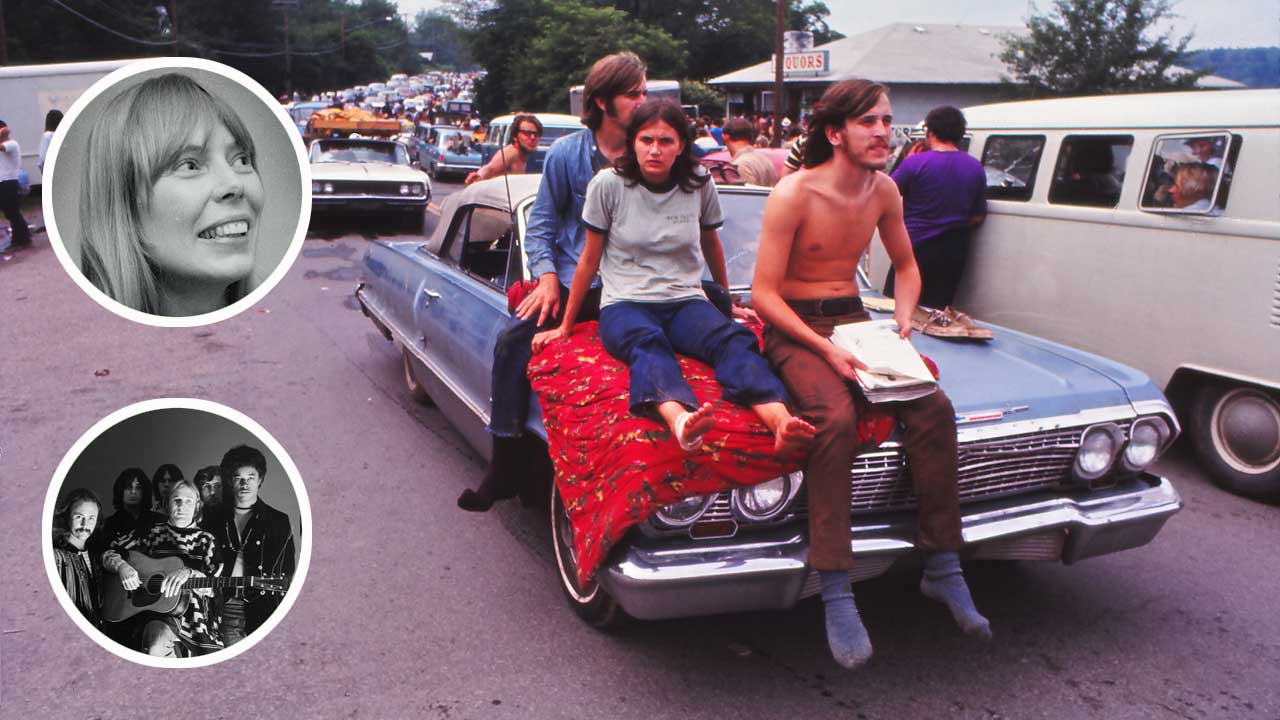How Joni Mitchell watched Woodstock on TV then wrote the song that captured its magic
Originally a b-side, Joni Mitchell's generational classic Woodstock found its biggest audience with Crosby, Stills, Nash & Young

Songwriters often hear the advice “write what you know.” But sometimes “writing what you don't know but can imagine” can make for an equally great song. Joni Mitchell's Woodstock, which found its biggest audience as a hit for Crosby, Stills, Nash & Young, is a shining example.
On August 15, 1969, Mitchell arrived at JFK Airport with CSNY and agent David Geffen, en route to the Woodstock Festival, in upstate New York. Mitchell was also scheduled to tape an episode of The Dick Cavett Show the next day in Manhattan. Amidst travel chaos, it was decided at the last minute that she couldn't do both.
“So Geffen took me back to his suite where he lived, and we watched it on TV,” Mitchell recalled on the CBC show The National. “I was the deprived kid who couldn't go, so I wrote the song from the point of view of a kid going. If I had been there in the back room with all the egomaniacal crap that goes on backstage, I would not have had that perspective.”
Joni's perspective was also influenced by what she called “a born-again Christian trip” phase that she was going through at the time. Looking at scenes of 400,000 kids huddled in the mud and rain, beatific smiles on their faces, listening to rock music, struck her as a “modern miracle.”
She said, “Woodstock, for some reason, impressed me as being like a modern-day fishes-and-loaves story. For a herd of people that large to cooperate so well, it was pretty remarkable and there was tremendous optimism. So I wrote the song out of these feelings.”
Her recorded version, a dreamy piano ballad, was the B-side to Big Yellow Taxi, and appeared on her 1970 album Ladies Of The Canyon. Mitchell's boyfriend at the time, Graham Nash, heard the song, took it to his bandmates and they set about rearranging it into a more upbeat rocker, with drums and fuzz guitar leads.
Interestingly, in its early stages, Stephen Stills jammed on a version with Jimi Hendrix and Buddy Miles at the Record Plant in NYC. Engineer Eddie Kramer said that Hendrix “helped the song along,” though his bass and guitar overdubs did not end up on the final CSNY version (this early take was released on the 2018 Hendrix album Both Sides of the Sky).
Sign up below to get the latest from Classic Rock, plus exclusive special offers, direct to your inbox!
CSNY's master was cut at Wally Heider Studios, in Los Angeles and San Francisco, during the autumn of 1969. Of course, it wouldn't be a CSNY record without some kind of sniping internal dispute, and this one had to do with Stills' original lead vocal, which he said he “replaced because one and a half verses were excruciatingly out of tune.”
But in Dave Zimmer's 2008 biography Crosby, Stills and Nash, Neil Young countered: “The track was magic. Then later on they were in the studio nitpicking, and Stephen erased the vocal and put another one on that wasn't nearly as good.”
The song, a single on the Déjà Vu album, went to #11 on the US charts (a slightly different version was featured under the closing credits of the 1970 documentary film Woodstock).
Meanwhile, across the pond, British band Matthews Southern Comfort (fronted by former Fairport Convention singer Iain Matthews) took their version of Woodstock to #1 in the UK / #23 in the US. And for good measure, a fourth cover by The Assembled Multitude got to #79 on the US charts in 1970.
Over the years, the song has remained a kind of musical shorthand for late '60s hippie idealism, while being covered by a range of artists, including America, Richie Havens, Eva Cassidy and John Legend.
Finally, in 1998, Joni Mitchell got to perform it at Woodstock. Well, sort of. At A Day In The Garden, a three-day event held on the original Yasgur's Farm site of the festival, she ended her set with the ballad that she'd written thirty years before as a mere observer.
Bill DeMain is a correspondent for BBC Glasgow, a regular contributor to MOJO, Classic Rock and Mental Floss, and the author of six books, including the best-selling Sgt. Pepper At 50. He is also an acclaimed musician and songwriter who's written for artists including Marshall Crenshaw, Teddy Thompson and Kim Richey. His songs have appeared in TV shows such as Private Practice and Sons of Anarchy. In 2013, he started Walkin' Nashville, a music history tour that's been the #1 rated activity on Trip Advisor. An avid bird-watcher, he also makes bird cards and prints.

